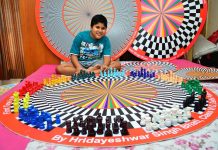Arrangement Based Puzzles: Set 71
Arrangement Based Questions are important for all competitive exams. We are here with daily sets of Arrangement based questions.
Study the following information carefully to answer the given questions.
Seven persons D, E, F, G, H, I and J goes to purchase stationary item on different days of the same week starting from Monday to Sunday but not necessarily in the same order. No two persons go on the same day. Each person purchased seven different stationary items viz; Rubber, Compass, Pencil, Ruler, Notebook, Sharpener and Pen but not necessarily in the same order. Each of them has some one rupee coins with them. Total number of coins is 18. Two of the persons have one coin each. The person who has 5 coins has the highest number of coins. There are two such pairs of persons who have the same number of coins. The number coins possessed by F is equal to the sum of the total number of coins of E and I. The one who purchased Rubber and the one who purchased Compass have the same number of coins.
The person, who purchased Pen, neither goes on Monday nor Sunday. The person who purchased Pencil, does not go on the immediate next day on which the person who purchased Compass goes. The person, who purchased Notebook, goes on Monday. The one who has the highest number of coins goes immediately after the one who has the second highest number of coins. The difference between the number of coins of the persons who goes on Friday and Sunday is equal to the number of coins possessed by D. Rubber was purchased immediately after the day on which F goes to the market and immediately before the day on which J goes to the market. Ruler was purchased on Thursday. The person, who purchased Sharpener, neither goes on Tuesday nor on Saturday. The person, who purchased Pencil, goes on immediately after D. E does not purchase Ruler. The person, who purchased Rubber has 1 coin. E goes on one of the days before Friday. Neither H nor I goes on Sunday. I goes immediately after H. D has more coins than F. The person who goes on Sunday has less than 3 coins. Only one person goes between the person, who purchased Ruler and the person, who purchased Pencil. The person, who purchased Compass, goes after two days of the person, who purchased Rubber.
(a) Monday
(b) Friday
(c) Wednesday
(d) Tuesday
(e) None of these
Q2. How many coins are possessed by the person who goes on Sunday?
(a) 1 coins
(b) 2 coins
(c) 4 coins
(d) 5 coins
(e) None of these
Q3. What is the difference between the number of coins of the person, who purchased Pencil and the person, who goes on Friday?
(a) 2 coins
(b) 4 coins
(c) 3 coins
(d) 5 coins
(e) None of these
Q4. How many persons go to market between D and I ?
(a) Two
(b) Five
(c) Four
(d) Three
(e) None of these
Q5. What is the sum of the number of coins possessed by the persons who went to the market on weekends?
(a) Two
(b) Three
(c) Four
(d) Six
(e) None of these
S1. Ans.(b)
S2. Ans.(b)
S3. Ans.(c)
S4. Ans.(c)
S5. Ans.(b)
























